大学英语四级听力历年真题及详细解析
- 格式:doc
- 大小:12.75 KB
- 文档页数:7
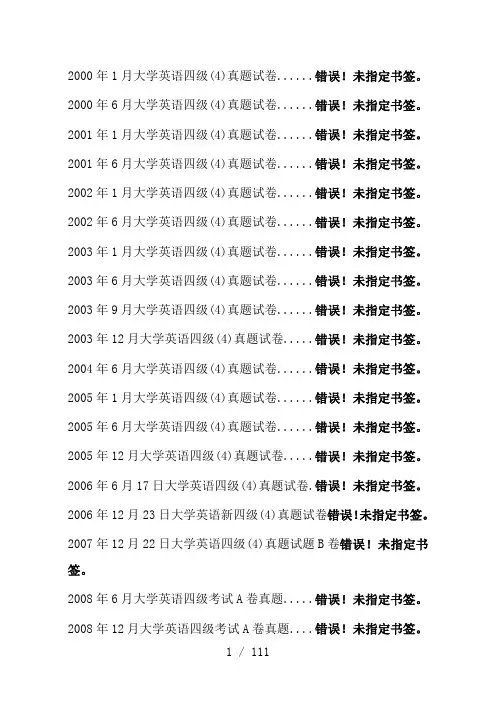
2000年1月大学英语四级(4)真题试卷......错误!未指定书签。
2000年6月大学英语四级(4)真题试卷......错误!未指定书签。
2001年1月大学英语四级(4)真题试卷......错误!未指定书签。
2001年6月大学英语四级(4)真题试卷......错误!未指定书签。
2002年1月大学英语四级(4)真题试卷......错误!未指定书签。
2002年6月大学英语四级(4)真题试卷......错误!未指定书签。
2003年1月大学英语四级(4)真题试卷......错误!未指定书签。
2003年6月大学英语四级(4)真题试卷......错误!未指定书签。
2003年9月大学英语四级(4)真题试卷......错误!未指定书签。
2003年12月大学英语四级(4)真题试卷.....错误!未指定书签。
2004年6月大学英语四级(4)真题试卷......错误!未指定书签。
2005年1月大学英语四级(4)真题试卷......错误!未指定书签。
2005年6月大学英语四级(4)真题试卷......错误!未指定书签。
2005年12月大学英语四级(4)真题试卷.....错误!未指定书签。
2006年6月17日大学英语四级(4)真题试卷.错误!未指定书签。
2006年12月23日大学英语新四级(4)真题试卷错误!未指定书签。
2007年12月22日大学英语四级(4)真题试题B卷错误!未指定书签。
2008年6月大学英语四级考试A卷真题.....错误!未指定书签。
2008年12月大学英语四级考试A卷真题....错误!未指定书签。
2009年6月英语四级考试真题与答案.......错误!未指定书签。
2009年12月英语四级考试真题与答案......错误!未指定书签。
2000年1月大学英语四级(4)真题试卷1. A) a .B) .C) a .D) .2. A) .B) .C) ’t ’s.D) ’t .3. A) a .B) a .C) .D) .4. A) .B) a .C) .D) a .5. A) ’s .B) .C) .D) ’t a .6. A) . .B) . .C) .D) o’.7. A) .B) .C) .D) ’t .8. A) ’t .B) ’t a .C) a .D) .9. A) a o’ .B) .C) .D) a .10. A) . a .B) . .C) . .D) . a .11 14 .11. A) A .B) A .C) ’s .D) .12. A) .B) .C) .D) .13. A) .B) .C) .D) .14. A) .B) .C) .D) .15 17 .15. A) .B) ’t .C) ’t .D) .16. A) .B) .C) .D) .17. A) .B) ’t .C) .D) a .18 20 .18. A) .B) .C) .D) .19. A) .B) .C) .D) .20. A) .B) .C) .D) .2000年6月大学英语四级(4)真题试卷1. A) .B) .C) a .D) ’t .2. A) .B) .C) .D) .3. A) ’s .B) ’s .C) .D) .4. A) ’t .B) ’t .C) .D) .5. A) .B) a .C) .D) .6. A) .B) .C) .D) a .7. A) ’s .B) ’s .C) ’s .D) ’s .8. A) A .B) A .C) A .D) A .9. A) .B) .C) .D) .10. A) A .B) a .C) a .D) .11 14 .11. A) .B) .C) .D) .12. A) .B) .C) .D) .13. A) .B) .C) .D) .14. A) .B) .C) .D) .15 17 .15. A) .B) .C) .D) .16. A) .B) .C) .D) .17. A) .B) .C) .D) .18 20 .18. A) .B) .C) .D) .19. A) 300 .B) .C) .D) ’s .20. A) .B) 40 .C) .D) 100 .2001年1月大学英语四级(4)真题试卷1. A) .B) ’s .C) a .D) .2. A) a .B) a .C) .D) a .3. A) ’s a .B) .C) ’s .D) .4. A) a .B) a .C) ’s .D) ’s .5. A) .C) .D) .6. A) .B) A .C) A .D) .7. A) .B) .C) .D) a .8. A) .B) a .C) .D) .9. A) .B) .C) .10. A) .B) ’t .C) ’s .D) .11 13 .11. A) a .B) a .C) a .D) a India.12. A) .B) .C) .D) .13. A) .B) .C) .D) ’s .14 16 .14. A) .B) a .C) .D) .15. A) .B) .C) .D) .16. A) .B) .C) .D) .17 20 .17. A) .B) .C) .D) .18. A) .B) .C) .D) .19. A) .B) .C) .D) ’ .20. A) .B) .C) ’s .D) ’ .2001年6月大学英语四级(4)真题试卷1. A) A .B) A .C) A a .D) A .2. A) .B) .C) .D) .3. A) a .B) .C) ’t .D) a a .4. A) .B) .C) a .D) .5. A) a .B) .C) a .D) .6. A) .B) .C) ’t .D) .7. A) 5:10.B) 5:00.C) 4:30.D) 5:15.8. A) .B) .C) .D) .9. A) a .B) a .C) .D) a .10. A) .B) .C) .D) .2002年1月大学英语四级(4)真题试卷1. A) a .B) ’s .C) ’s .D) ’t .2. A) ’t .B) .C) .D) .3. A) a .B) a .C) a .D) a .4. A) ’s .B) ’s .C) .D) ’s .5. A) .B) .C) .D) .6. A) .B) .C) .D) a .7. A) .B) .C) .D) .8. A) .B) .C) a .D) .9. A) . ’s .B) .C) . ’s .D) ’t .10. A) a .B) a .C) a .D) a .11 13 .11. A) ’t ’s .B) .C) .D) .12. A) .B) .C) .D) .13. A) .B) .C) .D) .14 16 .14. A) .B) .C) .D) a .15. A) .B) .C) .D) .16. A) .B) .C) .D) .17 20 .17. A) a .B) .C) London .D) .18. A) .B) .C) a .D) .19. A) .B) .C) .D) .20. A) ’t ’ .B) .C) .D) .2002年6月大学英语四级(4)真题试卷1. A) .B) .C) .D) .2. A) A .C) A .D) .3. A) a .B) .C) .D) a .4. A) .B) ’t .C) .D) .5. A) .B) .C) .D) ’t ’s .6. A) .B) .C) .7. A) .B) ’s .C) .D) ’s .8. A) a .B) .C) 9:14.D) ’s .9. A) a .B) a ’s.C) a .D) a .10. A) a .B) .C) a .D) .11 13 .11. A) .B) .C) .D) .12. A) –’t .B) .C) .D) .13. A) .B) .C) .D) .14 17 .14. A) A .B) A .C) A .D) .15. A) .B) .C) .D) .16. A) .B) .C) .D) .17. A) .B) .C) .D) .18 20 .18. A) .B) .C) .D) 14 .19. A) .B) .C) .D) .20. A) .B) .C) .D) a .2003年1月大学英语四级(4)真题试卷1. A) .B) .C) .D) .2. A) ’s , .C) ’s .D) ’s .3. A) .B) .C) .D) .4. A) .B) .C) .D) .5. A) .B) a .C) .D) .6. A) ’s .B) .C) .7. A) .B) 7 o’.C) ’t 7 o’.D) ’t .8. A) ’s a .B) ’s .C) ’s ’s .D) ’s a .9. A) .B) .C) .D) .10. A) .B) ’t .C) a .D) ’s .2003年6月大学英语四级(4)真题试卷1. A) a .B) a .C) a .D) a .2. A) .B) .C) a .D) .3. A) ’s .B) ’s .C) a .D) .4. A) .B) .C) .D) .5. A) a .B) a .C) .D) ’t .6. A) 8 .B) .C) .D) .7. A) .B) .C) .D) a .8. A) a .B) a .C) a .D) .9. A) a .B) .C) a .D) .10. A) ’s .B) ’s .C) ’s .D) ’s .11 13 .11. A) .B) .C) .D) .12. A) .B) .C) .D) .13. A) a .B) ’t .C) .D) .14 16 .14. A) a .B) a .C) .D) a .15. A) .B) .C) .D) .16. A) .B) .C) .D) .17 20 .17. A) .B) .C) .D) .18. A) .B) .C) .D) .19. A) a .B) .C) .D) a Britain.20. A) .B) 1948.C) .D) 1881.2003年9月大学英语四级(4)真题试卷1. A) a .B) .C) .D) .2. A) .B) .C) .D) ’s .3. A) a .B) a .C) a .D) a .4. A) .B) a .C) a .D) .5. A) .B) .C) .D) .6. A) .B) .C) a .D) a .7. A) .B) .D) a .8. A) .B) a .C) .D) ’s .9. A) .B) ’s .C) ’s .D) .10. A) ’s .B) ’s .C) ’s .D) ’s .11 13 .11. A) .B) .D) .12. A) .B) .C) .D) .13. A) .B) .C) .D) .14 17 .14. A) .B) a .C) .D) .15. A) AB) A .C) A .D) A .16. A) .B) .C) .D) .17. A) .B) .C) 55,000.D) .18 20 .18. A) A Bridge.B) A .C) A .D) A Bridge.19. A) .B) .C) .D) .20. A) .B) .C) .D) .2003年12月大学英语四级(4)真题试卷1. A) .B) .C) .D) a a .2. A) .B) .C) ’t a .D) .3. A) ’s .B) .C) .D) .4. A) a .B) a .C) .D) a .5. A) .B) .C) ’s .D) .6. A) . .B) . ’s .C) .D) . ’s .7. A) ’t .B) a .C) .D) a .8. A) ’t .B) ’s .C) .D) .9. A) a .B) .C) a .D) .10. A) .B) .C) .D) .11 13 . 11. A) .B) .C) .D) .12. A) .B) .C) .D) .13. A) a .B) .C) .D) .14 16 .14. A) ’t .B) .C) .D) .15. A) .B) .C) .D) a .16. A) .B) .C) .D) .17 20 .17. A) ’s .B) .C) .D) ’s a .18. A) a .B) A a .C) A .D) A a .19. A) A .B) .C) A .D) .20. A) .B) London.C) a .D) .2004年6月大学英语四级(4)真题试卷1. A) .B) 'sC) a .D) .2. A) .B) . .C) . .。
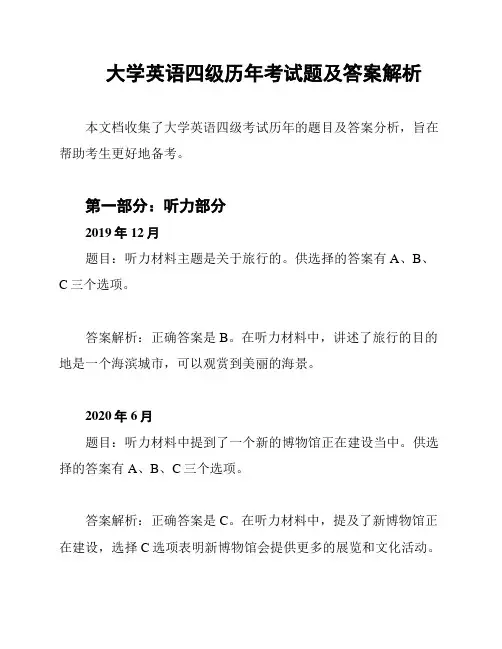
大学英语四级历年考试题及答案解析本文档收集了大学英语四级考试历年的题目及答案分析,旨在帮助考生更好地备考。
第一部分:听力部分2019年12月题目:听力材料主题是关于旅行的。
供选择的答案有A、B、C三个选项。
答案解析:正确答案是B。
在听力材料中,讲述了旅行的目的地是一个海滨城市,可以观赏到美丽的海景。
2020年6月题目:听力材料中提到了一个新的博物馆正在建设当中。
供选择的答案有A、B、C三个选项。
答案解析:正确答案是C。
在听力材料中,提及了新博物馆正在建设,选择C选项表明新博物馆会提供更多的展览和文化活动。
第二部分:阅读理解部分2019年12月题目:阅读材料中提到了一种新型的环保材料。
问题是这种材料的主要特点是什么?答案解析:正确答案是可降解。
在阅读材料中,指出了这种新型材料能够在一定条件下自我降解,从而减少对环境的污染。
2020年6月题目:阅读材料中提到了一位重要的科学家。
问题是他的主要贡献是什么?答案解析:正确答案是发现了一种新的药物。
在阅读材料中,介绍了该科学家发现了一种新的药物,可以治疗多种疾病。
第三部分:写作部分2019年12月题目:写作要求根据提供的图表,描述并比较两种不同的交通方式的优缺点。
答案解析:根据图表,可以发现公共交通拥有更多的优点,如环保、经济、舒适等;而私家车的优点则包括灵活性和便利性。
但是私家车使用过多会导致交通拥堵和环境污染。
2020年6月题目:写作要求根据提供的材料,阐述大学生是否应该研究金融知识。
答案解析:根据提供的材料,可以得出结论大学生应该研究金融知识。
研究金融知识能够帮助大学生提高理财技能,增加金融意识,并为未来的职业发展打下基础。
以上是大学英语四级历年考试题及答案解析的部分内容,希望对考生备考有所帮助。

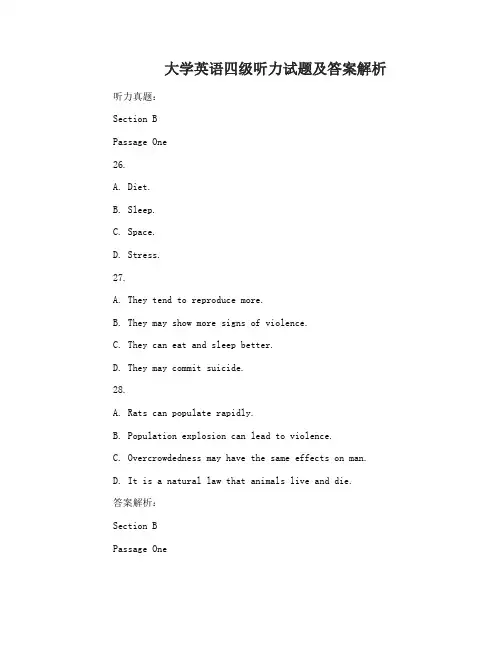
大学英语四级听力试题及答案解析听力真题:Section BPassage One26.A. Diet.B. Sleep.C. Space.D. Stress.27.A. They tend to reproduce more.B. They may show more signs of violence.C. They can eat and sleep better.D. They may commit suicide.28.A. Rats can populate rapidly.B. Population explosion can lead to violence.C. Overcrowdedness may have the same effects on man.D. It is a natural law that animals live and die.答案解析:Section BPassage OneHow much living space does a person need? What happens when his space requirements are not adequately met? Sociologists and psychologists are conducting experiments on rats to try to determine the effects of overcrowded conditions on man. Recent studies have shown that [26]the behavior of rats is greatly affected by space. If rats have adequate living space, they eat well, sleep well, and reproduce well. However, if their living conditions become too crowded, their behavior pattern and even their health perceptibly change. They cannot sleep and eat well, and signs of fear and tension become obvious. [27]The more crowded they are, the more they tend to bite each other and even kill each other. Thus for rats, population and violence are directly related. Is this a natural law for human society as well? [28]Is adequate space not only desirable, but essential for human survival?Questions 26 to 28 are based on the passage you have just heard.26. What affects rats' behavior?正确答案:C解析:听到“最近研究表明:鼠类行为受空间影响颇大”,可判断C(空间)正确。
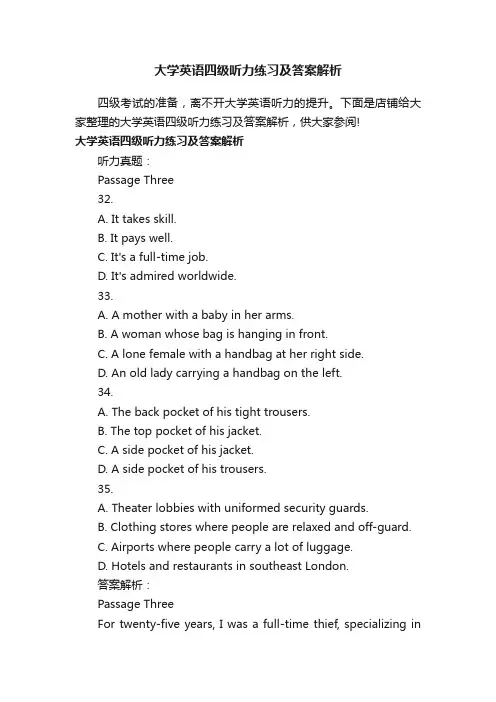
大学英语四级听力练习及答案解析四级考试的准备,离不开大学英语听力的提升。
下面是店铺给大家整理的大学英语四级听力练习及答案解析,供大家参阅!大学英语四级听力练习及答案解析听力真题:Passage Three32.A. It takes skill.B. It pays well.C. It's a full-time job.D. It's admired worldwide.33.A. A mother with a baby in her arms.B. A woman whose bag is hanging in front.C. A lone female with a handbag at her right side.D. An old lady carrying a handbag on the left.34.A. The back pocket of his tight trousers.B. The top pocket of his jacket.C. A side pocket of his jacket.D. A side pocket of his trousers.35.A. Theater lobbies with uniformed security guards.B. Clothing stores where people are relaxed and off-guard.C. Airports where people carry a lot of luggage.D. Hotels and restaurants in southeast London.答案解析:Passage ThreeFor twenty-five years, I was a full-time thief, specializing inpicking pockets. Where I come from in southeast London, that's an honorable profession. [32]Anyone can break in a house and steal things, but picking somebody's pocket takes skill. My sister and I were among the most successful pickpocket teams in London. We worked in hotel and theatre lobbies, airports, shopping centers and restaurants. Now we don't steal any more, but this crime is worldwide. Here's how to protect yourself. Professional pickpockets do not see victims-only handbags, jewels and money. [33]Mothers with babies, the elderly, and the disabled are all fair game. My preferred target was the lone female, handbag at her side-the right side to be exact. So if I'm next to her, I can reach it cautiously with my right hand across my body. Only about one woman in a thousand carries her bag on the left, and I tended to steer clear of them. Women whose bags are hanging in front of them are tricky for the pickpocket as there isn't a blind side. If you want to make it even harder, use a bag with handles rather than a strap. [34]For men, one of the best places to keep a wallet is in the back pocket of tight trousers.You'll feel any attempts to move it. Another good place is in the buttoned-up inside pocket of a jacket. There is just no way in. Even better, keep wallets attached to a cord or chain that is fastened to a belt. [35]A pickpocket needs targets who are relaxed and off-guard. The perfect setting is a clothing store. When customers wander among the racks they are completely absorbed in the items they hold up. The presence of a uniformed security guard is even better. A false sense of security makes a pickpocket's job much simpler.Questions 32 to 35 are based on the passage you have just heard.32. Why does the speaker say that picking somebody'spocket is an honorable profession in southeast London?正确答案:A解析:题目询问为什么作者说在伦敦东南部,扒窃是一个光荣的职业。
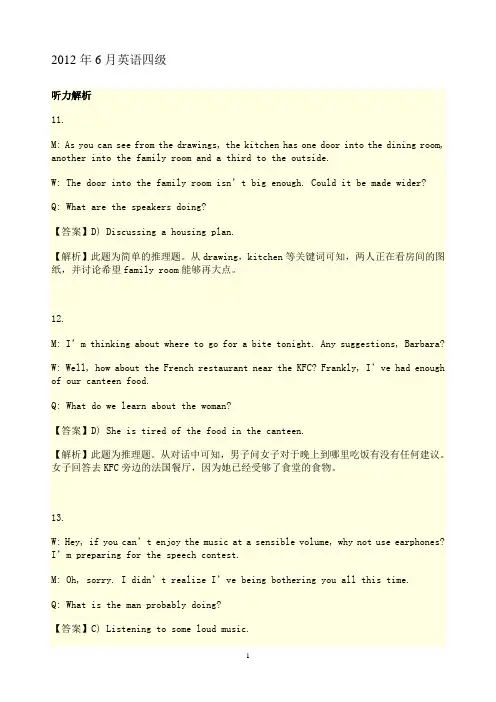
2012年6月英语四级听力解析11.M: As you can see from the drawings, the kitchen has one door into the dining room, another into the family room and a third to the outside.W: The door into the family room isn’t big enough. Could it be made wider?Q: What are the speakers doing?【答案】D) Discussing a housing plan.【解析】此题为简单的推理题。
从drawing,kitchen等关键词可知,两人正在看房间的图纸,并讨论希望family room能够再大点。
12.M: I’m thinking about where to go for a bite tonight. Any suggestions, Barbara?W: Well, how about the French restaurant near the KF C? Frankly, I’ve had enough of our canteen food.Q: What do we learn about the woman?【答案】D) She is tired of the food in the canteen.【解析】此题为推理题。
从对话中可知,男子问女子对于晚上到哪里吃饭有没有任何建议。
女子回答去KFC旁边的法国餐厅,因为她已经受够了食堂的食物。
13.W: Hey, if you can’t enjoy the music at a sen sible volume, why not use earphones? I’m preparing for the speech contest.M: Oh, sorry. I didn’t realize I’ve being bothering you all this time.Q: What is the man probably doing?【答案】C) Listening to some loud music.【解析】此题为较为简单的推理题。
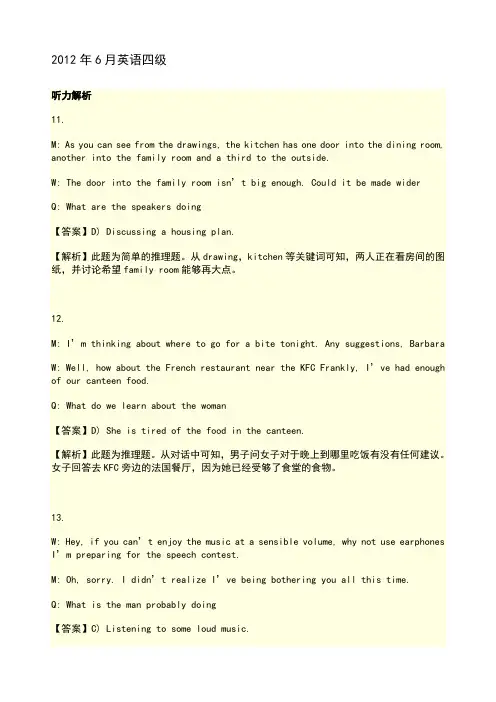
2012年6月英语四级听力解析11.M: As you can see from the drawings, the kitchen has one door into the dining room, another into the family room and a third to the outside.W: The door into the family room isn’t big enough. Could it be made widerQ: What are the speakers doing【答案】D) Discussing a housing plan.【解析】此题为简单的推理题。
从drawing,kitchen等关键词可知,两人正在看房间的图纸,并讨论希望family room能够再大点。
12.M: I’m thinking about where to go for a bite tonight. Any suggestions, BarbaraW: Well, how about the French restaurant near the KFC F rankly, I’ve had enough of our canteen food.Q: What do we learn about the woman【答案】D) She is tired of the food in the canteen.【解析】此题为推理题。
从对话中可知,男子问女子对于晚上到哪里吃饭有没有任何建议。
女子回答去KFC旁边的法国餐厅,因为她已经受够了食堂的食物。
13.W: Hey, if you can’t enjoy the music at a sensible volume, why not use earphones I’m preparing for the speech contest.M: Oh, sorry. I didn’t realize I’ve being bothering you all this time.Q: What is the man probably doing【答案】C) Listening to some loud music.【解析】此题为较为简单的推理题。
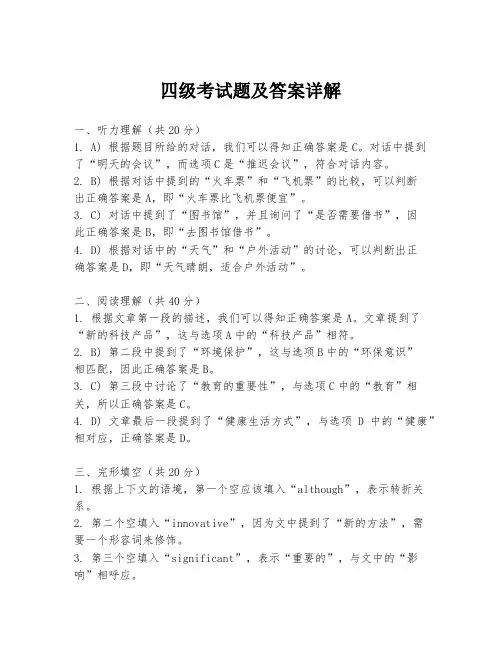
四级考试题及答案详解一、听力理解(共20分)1. A) 根据题目所给的对话,我们可以得知正确答案是C。
对话中提到了“明天的会议”,而选项C是“推迟会议”,符合对话内容。
2. B) 根据对话中提到的“火车票”和“飞机票”的比较,可以判断出正确答案是A,即“火车票比飞机票便宜”。
3. C) 对话中提到了“图书馆”,并且询问了“是否需要借书”,因此正确答案是B,即“去图书馆借书”。
4. D) 根据对话中的“天气”和“户外活动”的讨论,可以判断出正确答案是D,即“天气晴朗,适合户外活动”。
二、阅读理解(共40分)1. 根据文章第一段的描述,我们可以得知正确答案是A。
文章提到了“新的科技产品”,这与选项A中的“科技产品”相符。
2. B) 第二段中提到了“环境保护”,这与选项B中的“环保意识”相匹配,因此正确答案是B。
3. C) 第三段中讨论了“教育的重要性”,与选项C中的“教育”相关,所以正确答案是C。
4. D) 文章最后一段提到了“健康生活方式”,与选项D中的“健康”相对应,正确答案是D。
三、完形填空(共20分)1. 根据上下文的语境,第一个空应该填入“although”,表示转折关系。
2. 第二个空填入“innovative”,因为文中提到了“新的方法”,需要一个形容词来修饰。
3. 第三个空填入“significant”,表示“重要的”,与文中的“影响”相呼应。
4. 第四个空填入“consequences”,因为文中讨论了“后果”,需要一个名词来表示。
四、翻译(共20分)1. 将“中国有着悠久的历史和丰富的文化。
”翻译为英文是 "China has a long history and rich culture."2. “我们应该尊重每个人的选择。
”翻译为英文是 "We should respect everyone's choice."3. “这个项目的成功取决于团队的合作。
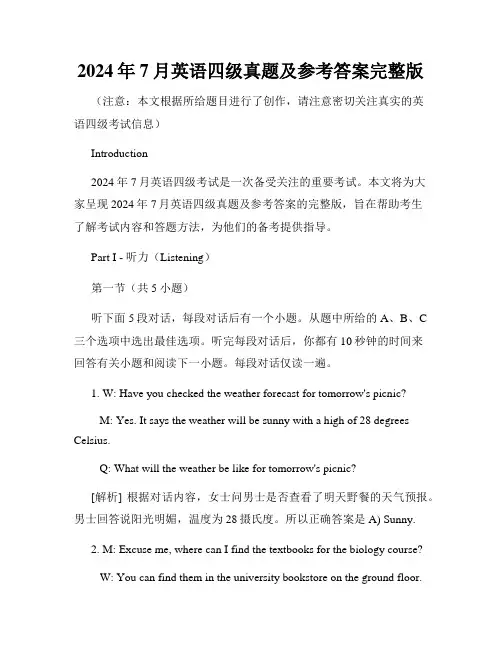
2024年7月英语四级真题及参考答案完整版(注意:本文根据所给题目进行了创作,请注意密切关注真实的英语四级考试信息)Introduction2024年7月英语四级考试是一次备受关注的重要考试。
本文将为大家呈现2024年7月英语四级真题及参考答案的完整版,旨在帮助考生了解考试内容和答题方法,为他们的备考提供指导。
Part I - 听力(Listening)第一节(共5小题)听下面5段对话,每段对话后有一个小题。
从题中所给的A、B、C 三个选项中选出最佳选项。
听完每段对话后,你都有10秒钟的时间来回答有关小题和阅读下一小题。
每段对话仅读一遍。
1. W: Have you checked the weather forecast for tomorrow's picnic?M: Yes. It says the weather will be sunny with a high of 28 degrees Celsius.Q: What will the weather be like for tomorrow's picnic?[解析] 根据对话内容,女士问男士是否查看了明天野餐的天气预报。
男士回答说阳光明媚,温度为28摄氏度。
所以正确答案是 A) Sunny.2. M: Excuse me, where can I find the textbooks for the biology course?W: You can find them in the university bookstore on the ground floor.Q: Where does the conversation most probably take place?[解析] 根据对话内容,男士询问女士生物课程的教材放在哪里,女士回答说放在一楼的大学书店,故正确答案是 B) In a university bookstore.3. W: The new mall is opening tomorrow. Would you like to go shopping there with me?M: I'd love to, but I have a meeting in the afternoon. How about this weekend?Q: What does the man mean?[解析] 女士邀请男士一起去新开的购物中心逛街,男士表示很想去但是有一个下午的会议,问女士这周末如何。
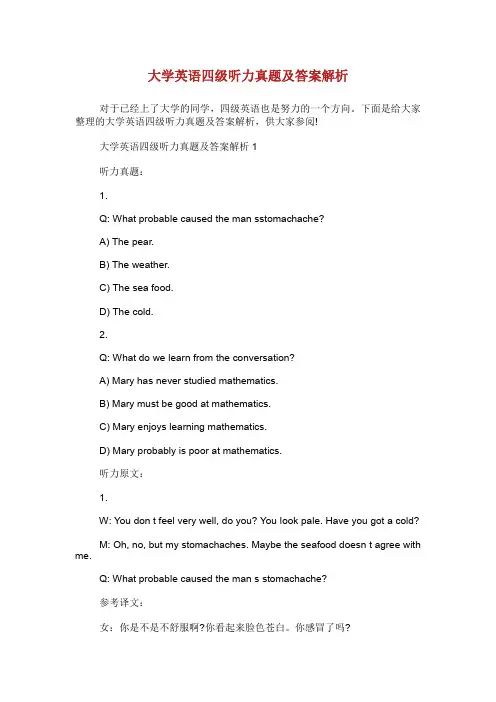
大学英语四级听力真题及答案解析对于已经上了大学的同学,四级英语也是努力的一个方向。
下面是给大家整理的大学英语四级听力真题及答案解析,供大家参阅!大学英语四级听力真题及答案解析1听力真题:1.Q: What probable caused the man sstomachache?A) The pear.B) The weather.C) The sea food.D) The cold.2.Q: What do we learn from the conversation?A) Mary has never studied mathematics.B) Mary must be good at mathematics.C) Mary enjoys learning mathematics.D) Mary probably is poor at mathematics.听力原文:1.W: You don t feel very well, do you? You look pale. Have you got a cold?M: Oh, no, but my stomachaches. Maybe the seafood doesn t agree with me.Q: What probable caused the man s stomachache?参考译文:女:你是不是不舒服啊?你看起来脸色苍白。
你感冒了吗?男:没有,不过我的胃很疼。
可能是海鲜不太对胃口。
问:男子胃疼是什么原因引起的?答案解析:正确答案为C。
对话中女子说男子脸色苍白,问他是不是感冒了,男子说没有感冒,是胃疼,可能是因为海鲜的原因,因此可知C项正确。
A,梨;B,天气;D,感冒,均与对话内容不符,排除。
2.M: What s the matter with Mary?W: She becomes nervous whenever it comes to learning mathematics.Q: What do we learn from the conversation?参考译文:男:玛丽怎么了?女:学习数学的时候她就变得很紧张。
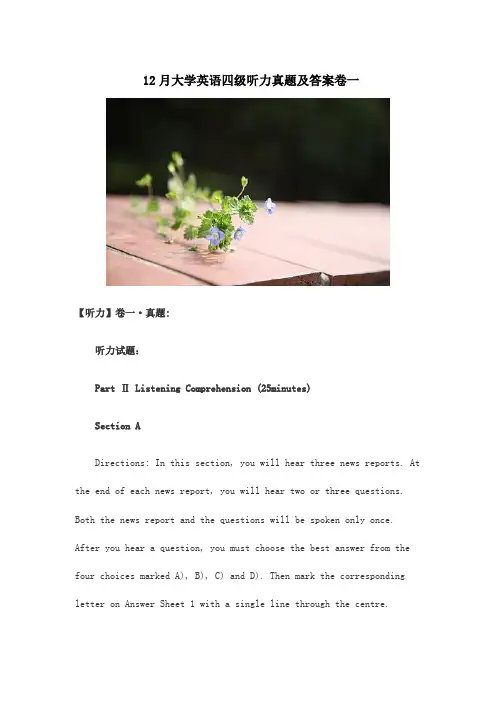
12月大学英语四级听力真题及答案卷一【听力】卷一·真题:听力试题:Part Ⅱ Listening Comprehension (25minutes)Section ADirections: In this section, you will hear three news reports. At the end of each news report, you will hear two or three questions. Both the news report and the questions will be spoken only once.After you hear a question, you must choose the best answer from the four choices marked A), B), C) and D). Then mark the corresponding letter on Answer Sheet 1 with a single line through the centre.Questions 1 to 2 are based on the conversation you have just heard.1. A) It was dangerous to live in. C) He could no longer pay the rent.B) It was going to be renovated. D) He had sold it to the royal family.2. A) A strike. C) A forest fire.B) A storm. D) A terrorist attack.Questions 3 to 4 are based on the conversation you have just heard.3. A) They lost contact with the emergency department.B) They were trapped in an underground elevator.C) They were injured by suddenly falling rocks.D) They sent calls for help via a portable radio.4. A) They tried hard to repair the elevator.B) They released the details of the accident.C) They sent supplies to keep the miners warm.D) They provided the miners with food and water.Questions 5 to 7 are based on the conversation you have just heard.5. A) Raise postage rates.B) Improve its services.C) Redesign delivery routes.D) Close some of its post offices.6. A) Shortening business hours.B) Closing offices on holidays.C) Stopping mail delivery on Saturdays.D) Computerizing mail sorting processes.7. A) Many post office staff will lose their jobs.B) Many people will begin to complain.C) Taxpayers will be very pleased.D) A lot of controversy will arise.听力原文短篇新闻2Section A - 2Rescue efforts were underway Thursday morning for 17 miners who were stuck in an elevator below ground at a Cargill rock salt mine near Lansing, New York, according to Marcia Lynch.Public information officer with Tompkins County’s emergency response department, emergency workers have made contact with the miners via a radio. And they all appear to be uninjured, said Jessica Verfuss, the emergency department’s assistant director.Crews have managed to provide heat packs and blankets to the miners so that they can keep warm during the rescue operation, Verfuss said. Details about what led to the workers’ being trapped in the elevator went immediately available. The mine, along New York’s Cayuga Lake, processes salt used for road treatment. It produces about 2 million tons of salt that is shipped to more than 1,500 places in the northeastern United States, the rock salt mine is one of three operated by Cargill with the other two in Louisiana and Ohio.Q3. What does the news report say about the salt miners?Q4.What did the rescue team do?短篇新闻3Section A - 3The U.S. Postal Service announced today that it is considering closing about 3,700 post offices over the next year because offalling revenues.Facing an $8.3 billion budget deficit this year, closing post officers is one of several proposals the Postal Service has put forth recently to cut costs. Last week, for example, Postmaster General Pat Donahoe announced plans to stop mail delivery on Saturdays, a move he says could save $3 billion annually.“We are losing revenue as we speak,” Donahoe said. “We do not want taxpayer money. We want to be self-sufficient. So like any other business you have to make choices.”Dean Granholm the vice president for delivery and post office operations said the first waves of closings would begin this fall. He estimated that about 3,000 postmasters, 500 station managers and between 500 and 1,000 postal clerks could lose their jobs.Q5.What is the U.S. Postal Service planning to do?Q6.What measure has been planned to save costs?Q7.What will happen when the proposed measure come into effect? Section BDirections: In this section, you will hear two long conversations. At the end of each conversation you will hear four questions. Boththe conversations and the question-s will be spoken only once. After you hear a question, you must choose the best answer from the four choices marked A), B), C) and D). Then mark the corresponding letter on Answer Sheet 1 with a single line through the centre.Questions 8 to 11 are based on the conversation you have just heard.8. A) He will be kept from promotion.B) He will go through retraining.C) He will be given a warning.D) He will lose part of his pay.9. A) He is always on time.B) He is a trustworthy guy.C) He is an experienced press operator.D) He is on good terms with his workmates.10. A) She is a trade union representative.B) She is in charge of public relations.C) She is a senior manager of the shop.D) She is better at handling such matters.11. A) He is skilled and experienced.B) He is very close to the manager.C) He is always trying to stir up trouble.D) He is always complaining about low wages.Questions 12 to 15 are based on the conversation you have just heard.12. A) Open.B) Selfish.C) Friendly.D) Reserved.13. A) They stay quiet.B) They read a book.C) They talk about the weather.D) They chat with fellow passengers.14. A) She was always treated as a foreigner.B) She was eager to visit an English castle.C) She was never invited to a colleague’s home.D) She was unwilling to make friends with workmates.15. A) Houses are much more quiet.B) Houses provide more privacy.C) They want to have more space.D) They want a garden of their own.听力原文:长对话1&2Conversation 1A: Mrs. Hampton, we've got trouble in the press room this morning.B: Oh dear. What about?A: One of the press operators arrived an hour and a half late.B: But that's a straightforward affair. He will simply lose partof his pay. That's why we have a clock-in system.A: But the point is the man was clocked-in at 8 o'clock. We have John standing by the time clock, and he swears he saw nothing irregular.B: Is John reliable?A: Yes, he is. That's why we chose him for the job.B: Have you spoken to the man who was late?A: Not yet. I thought I'd have a word with you first. He's a difficult man, and I think there's been some trouble on the shop floor. I've got a feeling that trade union representative is behind this. The manager told me that Jack Green's been very active around the shop the last few days.B: Well, what do you want me to do?A: I was wondering if you'd see Smith, the man who was late, because you are so much better at handling things like this.B: Oh, alright. I'll see him. I must say I agree with you about there being bad feelings in the works. I've had the idea for sometime that Jack Green's been busy stirring things up in connectionwith the latest wage claim. He's always trying to make trouble. Well, I'll get the manager to send Smith up here.Q8. What will happen to the press operator who was late for the work according to the woman?Q9. What does the man say about John who stands by the time clock?Q10. Why does the man suggest the woman see the worker who was late?Q11. What does the woman say about Jack Green?Conversation 2A: Our topic today is about somethings that foreigners nearly always say when they visit Britain. It's 'Why are the British so cold?' And they're talking about the British personality – thefamous British 'reserve'. It means that we aren't very friendly, we aren't very open.B: So do you think it's true?A: It's a difficult one. So many people who visit Britain sayit's difficult to make friends with British people. They say we're cold, reserved, unfriendly...B: I think it's true. Look at Americans or Australians. They speak the same language, but they're much more open. And you see it when you travel, people - I mean strangers - speak to you on the street or on the train. British people seldom speak on the train. Or the bus. Not in London, anyway.A: 'Not in London'. That's it. Capital cities are full of tourists and are never very friendly. People are different in other parts of the country.B: Not completely. I met a woman once, an Italian. She's been working in Manchester for two years,and no one - not one of her colleagues - had ever invited her to their home. They were friendly to her at work, but nothing else. She couldn't believe it. She said that would never happen in Italy.A: You know what they say – 'an Englishman's home is his castle'. It’s really difficult to get inside.B: Yeah. It's about being private. You go home to your house and your garden and you close the door. It's your place.A: That's why the British don't like flats. They prefer to livein houses.B: That’s true.Q12. What do foreigners generally think of British people according to the woman?Q13. What may British people typically do one the train according to the man?Q14. What does the man say about the Italian woman working in Manchester?Q15. Why do British people prefer houses to flats?Section CDirections: In this section, you will hear three passages. At the end of each passage, you will hear three or four questions. Both the passage and the questions will be spoken only once. After you hear a question, you must choose the best answer from the four choices marked A), B), C) and D).Then mark the corresponding letter on Answer Sheet 1 with a single line through the centre.Questions 16 to 18 are based on the conversation you have just heard.16. A) They don’t have much choice of jobs.B) They are likely to get much higher pay.C) They don’t have to go through job interviews.D) They will automatically be given hiring priority.17. A) Ask their professors for help.B) Look at school bulletin boards.C) Visit the school careers service.D) Go through campus newspapers.18. A) Helping students find the books and journals they need.B) Supervising study spaces to ensure a quiet atmosphere.C) Helping students arrange appointments with librarians.D) Providing students with information about the library.Questions 19 to 21 are based on the conversation you have just heard.19. A) It tastes better.B) It is easier to grow.C) It may be sold at a higher price.D) It can better survive extreme weathers.20. A) It is healthier than green tea.B) It can grow in drier soil.C) It will replace green tea one day.D) It is immune to various diseases.21. A) It has been well received by many tea drinkers.B) It does not bring the promised health benefits.C) It has made tea farmers’ life easier.D) It does not have a stable market.Questions 22 to 25 are based on the conversation you have just heard.22. A) They need decorations to show their status.B) They prefer unique objects of high quality.C) They decorate their homes themselves.D) They care more about environment.23. A) They were proud of their creations.B) They could only try to create at night.C) They made great contributions to society.D) They focused on the quality of their products.24. A) Make wise choices.B) Identify fake crafts.C) Design handicrafts themselves.D) Learn the importance of creation.25. A) To boost the local economy.B) To attract foreign investments.C) To arouse public interest in crafts.D) To preserve the traditional culture.听力原文听力篇章:Passage OneIn college, time is scarce, and consequently, very precious. At the same time, expenses in college pile up surprisingly quickly. A part time job is a good way to balance costs while ensuring there is enough time left over for both academic subjects and after-class activities.If you are a college student looking for a part time job, the best place to start your job search is right on campus. There are tons of on-campus job opportunities, and as a student, you’ll automatically be given hiring priority. Plus, on-campus jobs eliminate commuting time, and could be a great way to connect with academic and professional resources at your university. Check withyour school’s career service or employment office for help to find a campus job. Of course, there are opportunities for part-time workoff-campus, too. If you spend a little time digging for the right part time jobs, you’ll save yourself time when you find a job that leaves you with enough time to get your school work done, too. If you are a college student looking for work but worry you won’t have enough time to devote to academic subjects, consider working as a study hall or a library monitor. Responsibilities generally include supervising study spaces to ensure that a quiet atmosphere is maintained. It’s a pretty easy job, but one with lots of downtime-which means you will have plenty of time to catch up on reading, do homework or study for an exam.Q16: What does the speaker say about college students applyingfor on-campus jobs?Q17: What can students do to find a campus job according to the speaker?Q18: What does the speaker say is a library monitor’s responsibility?Passage TwoAgricultural workers in green tea fields near Mt. Kenya are gathering the tea leaves. It is beautiful to see. The rows of tea bushes are straight. All appears to be well. But the farmers who planted the bushes are worried. Nelson Kibara is one of them. He has been growing tea in the Kerugoya area for 40 years.He says the prices this year have been so low that he has made almost no profit. He says he must grow different kinds of tea if he is to survive.Mr. Kibara and hundreds of other farmers have been removing some of their tea bushes and planting a new kind of tea developed by the Tea Research Foundation of Kenya. Its leaves are purple and brown. When the tea is boiled, the drink has a purple color. Medical researchers have studied the health benefits of the new tea. They say it is healthier than green tea and could be sold for a price that is three to four times higher than the price of green tea.But Mr. Kibara says he has not received a higher price for his purple tea crop.He says the market for the tea is unstable and he is often forced to sell his purple tea for the same price as green tea leaves. Hesays there are not enough buyers willing to pay more for the purple tea.Q19. Why have tea farmers in Kenya decided to grow purple tea?Q20. What do researchers say about purple tea?Q21. What does Mr. Kibara find about purple tea?Passage ThreeToday's consumers want beautiful handcrafted s to wear and tohave for their home environment. They prefer something unique andthey demand quality. Craftsmen today are meeting this demand. People and homes are showing great change as more and more uniquehandcrafted items become available. Handcrafts are big business. No long does a good craftsman have to work in a job he dislikes all day and then try to create at night. He has earned his professional status. He is now a respected member of society. Parts of the fun of being a craftsman is meeting other craftsmen. They love to sharetheir ideas and materials and help others find markets for their work. Craftsmen have helped educate consumers to make wise choices. They help them become aware of design and technique. They help them relate their choice to its intended use. They often involve consumers intrying the craft themselves. When a group of craftsmen expends to include more members, a small craft organization is formed. Such an organization does a lot in training workshops in special media, craft marketing techniques, craft fairs and sales, festivals, TV appearances and demonstrations. State art councils help sponsor local arts and crafts festivals which draw crowds of tourist consumers.This boosts the local economy considerably because tourists not only buy crafts, but they also use the restaurants and hotels and other services of the area.Q22. What does the speaker say about today's consumers?Q23. What does the speaker say about a good craftsman in the past?Q24. What do craftsmen help consumers do?Q25. Why do state art councilshelp sponsor local arts and crafts festivals?听力参照答案:Section A1. [A] It was dangerous to live in.2. [B] A storm3. [B] They were trapped in an underground elevator.4. [C] They sent supplies to keep the miners warm.5. [D] Close some of its post office.6. [C] Stopping mail delivery on Saturdays.7. [A] Many post office staff will lose their jobs. Section B8. [D] He will lose part of his pay.9. [B] He is a trustworthy guy.10.[D] She is better at handling such matters.11.[C] He is always trying to stir up trouble.12. [D] Reserved13. [A] They stay quiet14. [C] She was never invited to a colleague’s home.15. [B] Houses provide more privacySection C16. [D] They will automatically be given hiring priority.17. [C] Visit the school careers service.18. [B] Supervising study spaces to ensure a quiet atmosphere.19. [C] It may be sold at a higher price.20. [A] It is healthier than green tee.21. [D] It does not have a stable market.22. [B] They prefer unique s of high quality.23. [B] They could only try to create at night.24. [A] Make wise choices.25. [A] To boost the local economy.更多理解请加:群名称:英语四级冲刺资料共享群号:。
四六级听力答案及试题解析一、短对话理解(共8题,每题1分)1. A) The man is going to the library.B) The woman is looking for a book.C) The man is asking for directions.D) The woman is planning to study abroad.答案:A2. A) The woman forgot to bring her camera.B) The man is not interested in photography.C) The woman is upset about the weather.D) The man is late for the photography class.答案:C3. A) The man is worried about the exam.B) The woman is confident about her performance.C) The woman is going to help the man study.D) The man is considering dropping the course.答案:B4. A) The woman is a college professor.B) The man is a high school student.C) The woman is a university student.D) The man is a graduate student.答案:D5. A) The man is going to the beach.B) The woman is inviting the man to a party.C) The man is busy with his work.D) The woman is not interested in going out.答案:C6. A) The man is looking for a job.B) The woman is offering the man a job.C) The man is applying for a scholarship.D) The woman is asking for a raise.答案:B7. A) The woman is a vegetarian.B) The man is allergic to seafood.C) The woman is on a diet.D) The man is not hungry.答案:A8. A) The man is a professional athlete.B) The woman is a sports coach.C) The man is a sports fan.D) The woman is a fitness instructor.答案:C二、长对话理解(共7题,每题1分)9. What is the main topic of the conversation?A) A new restaurant in town.B) A cooking class.C) A cooking competition.D) A cooking show on TV.答案:B10. Why does the man want to take the cooking class?A) To learn how to cook for his family.B) To impress his girlfriend.C) To improve his cooking skills.D) To meet new people.答案:C11. What does the woman think about the cooking class?A) It's too expensive.B) It's not suitable for beginners.C) It's a good opportunity to learn.D) It's not worth the time.答案:C12. What is the man's concern about the cooking class?A) The class size is too large.B) The class schedule conflicts with his work.C) The class location is inconvenient.D) The class instructor is not experienced.答案:B13. What does the woman suggest the man do?A) Look for a different class.B) Talk to the instructor about his schedule.C) Ask his employer for a schedule change.D) Give up the idea of taking the class.答案:B14. What is the man's final decision?A) He will take the class.B) He will look for another class.C) He will discuss his schedule with his employer.D) He will wait until the next session.答案:A15. What is the woman's opinion about the cooking competition?A) It's a great opportunity to showcase talent.B) It's too competitive and stressful.C) It's only for professional chefs.D) It's not worth the effort.答案:A16. What is the man's reason for not being interested in the competition?A) He doesn't have enough experience.B) He doesn't like the competitive atmosphere.C) He's not confident in his cooking skills.D) He's already committed to another event.答案:C17. What does the woman suggest the man do if he wants to participate in the competition?A) Practice more and gain confidence.B) Find a partner to compete with.C) Join a cooking club to improve his skills.D) Take the cooking class to learn new techniques.答案:A三、短文理解(共10题,每题1分)18. What is the speaker mainly talking about?A) The importance of teamwork in sports.B) The role of a team captain in sports.C) The qualities of a good sports team.D) The impact of sports on personal development。
大学英语四级听力及答案解析大学英语四级听力材料及答案解析听力真题:Section BPassage One26.A. Requesting one's business card directly.B. Accepting one's card but not continuing contactwith him.C. Putting one's business card in the card file.D. Refusing a request for your business card directly.27.A. Say "Thank you." and put it away.B. Say "Thank you." and e某amine it briefly.C. Say "Thank you." and put it in your card file.D. Say "Thank you." and pass it to your secretary.28.A. To recall someone's name and title.B. To arrange the ne某t meeting.C. To record the meeting one is attending.D. To promote understanding between businessmen.答案解析:Section BPassage OneRequesting someone's business card is a straightforward process. You need only say, "Do you have a business card?" or "May I have your business card?" When you want to present your own card, you can say, "Here's my card. Please feel free to call me if you have any suggestions." If you wish to offer your card to a long-timeassociate, you can say, "Did I ever give you my card?" or "I mean to give you my card." [26]It's not polite to directly refuse a request from someone for your business card. Instead, you can say, "Sorry, but I'm afraid I'm all out at the moment." or "I neglected to bring them with me." Giving someone your card, of course, does not obligate you to continue contact, nor does accepting someone else's card. [27]When you do receive a card, say "Thank you." and e某amine it briefly before putting it away. [28]You can use a business card that you received to refresh your memory about someone's name and title before your ne某t meeting. You can also record notes about the meeting on the back of the card, or place it in your card file.Questions 26 to 28 are based on the passage you have just heard.26. Which of the following is an impolite behavior according to the passage?正确答案:D解析:短文提到,“直接拒绝别人索要名片的要求是不礼貌的。
大学英语新四级考试听力练习题及答案解析大学图书馆阅览室听英语听力时,你听的是四级的还是六级的呢?下面是店铺给大家整理的大学英语新四级考试听力练习题及答案解析,供大家参阅!大学英语新四级考试听力练习题及答案解析听力真题:9.Q: What can we infer from the conversation?A) The exam was easier than the previous one.B) Joe is sure that he will do better in the next exam.C) Joe probably failed in the exam.D) The oral part of the exam was easier than thewritten part.10.Q: How does the woman feel about driving to work?A) She is tired of driving in heavy traffic.B) She doesn’t mind it as the road conditions are good.C) She is unhappy to have to drive such a long way every day.D) She enjoys it because she’s good at driving.听力原文:9.W: Listen to me, Joe, the exam is already a thing ofthe past. Just forget about it.M: That's easier said than done.Q: What can we infer from the conversation?参考译文:女:听我说,乔,考试已经成为过去了。
就忘了它吧。
男:说起来容易做起来难。
2011-2020年大学英语四级听力真题精选6(总分:248.50,做题时间:40分钟)一、Listening Comprehension(总题数:10,分数:248.50)Questions 1 to 3 are based on the conversation you have just heard.【真题来源:2011年12月大学英语四级真题Part Ⅲ,Section A,第23-25题】(分数:21.3)(1).(分数:7.1)A.English Literature.B.Management.C.French. √D.Public Administration.解析:听力原文:Conversation TwoW: What kind of training does one need to go into this type of job?M: That's a very good question. I don't think there is any, specifically.W: For example, in your case, what was your educational background?M: Well, I did a degree in French at Nottingham. After that, I did careers work in secondary schools like the careers guidance people here is in the university. Then I went into local government because I found I was more interested in the administrative side. Then progressed on to universities. So there wasn't any plan and there was no specific training. There are plenty of training courses in management techniques and committee work which you can attend now.W: But in the first place, you did a French degree.M: In my time, there wasn't a degree you could do for administration. I think most of the administrators I've come across have degrees and all sorts of things.W: Well, I know in my case, I did an English literature degree and I didn't really expect to end up doing what I am doing now.M: Quite.W: But you are local to Nottingham, actually? Is there any reason why you went to Nottingham University?M: No, no, I come from the north of England, from west Yorkshire. Nottingham was one of the universities I put on my list. And I like the look of it. The campus is just beautiful.W: Yes, indeed. Let's see. Were you from the industrial part of Yorkshire?M: Yes, from the Woolen District.Q23:What was the man's major at university?细节题。
12月大学英语四级听力真题PartⅡListening Comprehension(30 minutes)Section ADirections: In this section, you will hear 8 short conversations and 2 long conversations. At the end of each conversation, one or more questions will be asked about what was said. Both the conversation and the questions will be spoken only once. After each question there will be a pause. During the pause, you must read the four choices marked A), B), C) and D), and decide which is the best answer. Then mark the corresponding letter on Answer Sheet 1 with a single line through the centre.1. A) The woman is now working in a kindergarten.B) The man will soon start a business of his own.C) The man would like to be a high school teacher.D) The woman is going to major in child education.2. A) The furniture has to be rearranged.B) The sound equipment has to be set up.C) The conference room has to be cleaned.D) The video machine has to be checked.3. A) She is exhausted.B) She is near-sighted.C) She cannot finish work in time.D) She cannot go straight home.4. A) The woman is too particular about food.B) He would rather have a meal an hour later.C) The woman should order her food quickly.D) He usually prefers ice-cream to sandwiches.5. A) He is not a good mechanic.B) He doesn't keep his promises.C) He spends his spare time doing repairs.D) He is always ready to offer help to others.6. A) Sam has a big family to support.B) Sam is not interested in traveling.C) The pay offered by the travel agency is too low.D) The work hours in the travel agency arc too long7. A) International trade.B) Product development.C) Financial consulting.D) Domestic retailing.8. A) Go on a business trip.B) Look for a job in Miami.C) Make a ticket reservation.D) Take a vacation.Questions 9 to 11 are based on the conversation you have just heard.9. A) It is located on Route 18.B) It has an interesting museum.C) It is a beautiful little town.D) It lies seven miles east of Newton.10. A) They are in opposite directions.B) They are fifty-five miles apart.C) They are quite close to each other.D) They are a long drive from Norwalk.11. A) They are connected by RouteB) They are crowded with tourists.C) They have lots of old houses.D) They have many rare plants.Questions 12 to 15 are based on the conversation you havejust heard.12. A) Bring him up to date on the current situation in Milan.B) Inform him of the arrangements for his trip in Italy.C) Fetch the documents signed by Mr. Gartner.D) Accompany Mr. Gartner to the Linate airport.13. A) About 8:30. B) About 6:30. C) About 5:30. D) About 4:15.14. A) Mr. Gartner from Milan.B) Gianni Riva at Megastar.C) The company's sales representative.D) Gavin from the Chamber of Commerce.15. A) Travel agent. B) Business manager. C) Secretary.D) Saleswoman.Section BDirections: In this section, you will hear 3 short passages. At the end of each passage, you will hear some questions. Both the passage and the questions will be spoken only once. After you hear a question, you must choose the best answer from the four choices marked A), B), C) and D). Then markthe corresponding letter on Answer Sheet 1 with a single line through the centre.Passage OneQuestions 16 to 19 are based on the conversation you have just heard.16. A) She had a desire to help others.B) She wanted to find out more about it.C) She needed some overseas experience.D) She was interested in farming.17. A) Carry out a cultural exchange program.B) Work on an agricultural project.C) Learn Portuguese.D) Teach English.18. A) She found it difficult to secure a job in her own country.B) She wanted to renew her contact with the Peace Corps.C) She was invited to work as an English teacher.D) She could not get the country out of her mind.19. A) By teaching additional English classes.B) By writing stories for American newspapers.C) By working part time for the Peace Corps.D) By doing odd jobs for local institutions.Passage TwoQuestions 20 to 22 are based on the passage you have just heard.20. A) Time spent exercising.B) Time spent working.C) Time spent on leisure activities.D) Time spent with friends and family.21. A) Reading. B) Surfing the Web. C) Eating out.D) Watching TV.22. A) Driving. B) Gardening. C) Going to the pub.D) Visiting friends.Passage ThreeQuestions 23 to 25 are based on the passage you have just heard.23. A) The car driver was trying to avoid hitting a rabbit.B) The car driver was partly responsible for the accident.C) McLaughlin was talking to his manager while driving.D) McLaughlin's carelessness resulted in the collision.24. A) He crashed into a car parked there.B) He knocked down several mailboxes.C) He tore down the company's main gate.D) He did serious damage to a loaded truck.25. A) He will lose his job.B) He will have to pay damages.C) He will be fined heavily.D) He will receive retraining.Section CDirections: In this section, you will hear a passage three times. When the passage is read for the first time, you should listen carefully for its general idea. When the passage is read for the second time, you are required to fill in the blanks with the exact words you have just heard. Finally, when the passage is read for the third time, you should check what you have written.When Captain Cook asked the chiefs in Tahiti why they always ate __26__, they replied. "Because it is right." If we askAmericans why they eat with knives and forks, or why their men wear pants __27__ skirts, or why they may be married to only one person at a time, we are likely to get __28__ and very uninformative answers: "Because it's right. " "Because that's the way it's done." "Because it's the __29__. " Or even "I don't know. " The reason for these and countless other patterns of social behavior is that they are __30__ by social norms-shared rules or guidelines which prescribe the behavior that is appropriate in a given situation. Norms __31__ how people "ought" to behave under particular circumstances in a particular society. We conform(遵守) to norms so readily that we are hardly aware they __32__. In fact, we are much more likely to notice __33__ from norms than conformity to them. You would not be surprised if a stranger tried to shake hands when you were introduced, but you might be a little __34__ if they bowed, started to stroke you, or kissed you on both __35__ Yet each of these other forms of greeting is appropriate in other parts of the world. When we visit another society whose norms are different, we quickly become aware that things we do this way, they do that way.听力文本及答案Question 1M: After high school, I’d like to go to college and major in business administration.W: But I’d rather spend my college days finding out how children learn.Q: What do we learn from the conversation?Question 2W: Is everything ready for the conference?M: The only thing left to do is set up the microphones and speakers. They'll be here in a few minutes.Q: What preparations have yet to be made?Question 3W: Is it almost time to go home now? I'm so tired. I can hardly see straight.M: Just a few more minutes, then we can go.Q: What is the woman’s problem?Question 4W: I'm not sure what I’m in a mo od for. Ice-cream or sandwiches? They are both really good here.M: The movie starts in an hour. And we still have to get there and park. So just make a decision.Q: What does the man mean?Question 5W: Tom said he would come to repair our solar heater when he has time.M: He often says he is willing to help, but he never seems to have time.Q: What does the man imply about Tom?Question 6W: So you know that Sam turns down the job offered by the travel agency.M: Yes. The hours were convenient. But if he had accepted it, he wouldn’t be able to make ends meet.Q: What do we learn from the conversation?Question 7M: Could you tell me a bit about the business your company is doing?W: We mainly deal with large volume buyers from western countries and our products have been well received.Q: What business is the woman’s company doing? Question 8W: Yesterday I made reservations for my trip to Miami next month.M: You must really be looking forward to it. You haven’t had any time off for at least two years.Q: What is the woman going to do?【答案】1.D The woman is going to major in child education.2.B The sound equipment has to be set up.3.A She is exhausted.4.C The woman should order her food quickly.5. B He doesn’t keep his promises.6.C The pay offer by the travel agency is too low.7.A International trade.8.D Take a vacation.【点评】本次四级短对话无论从对话内容还是从题目自身来看,整体难度相对简朴,和往年该部分相类似,话题覆盖平常生活(生活琐事、看电影、旅游等)、校园生活、商务工作(会议、求职等)。
英语四级听力真题精选及解析Introduction:As one of the most challenging sections of the English proficiency test, the listening part often causes anxiety among test-takers. In this article, we will present a compilation of selected English four-level listening test questions, along with detailed explanations and tips for better understanding. By reviewing these questions and learning from the analysis, you will be better prepared to tackle the listening section and improve your overall English skills.Question 1:[Speaker 1] Good morning, everyone. Today, I'd like to introduce our guest speaker for the month, Professor Emily Johnson. She is a renowned scholar in the field of environmental science and sustainability. Professor Johnson will deliver a lecture on the importance of renewable energy sources and their potential impact on our environment. The lecture will start at 2 p.m. in the main auditorium. Please make sure to arrive early to secure your seats. Refreshments will be provided afterwards. Don't miss out on this valuable opportunity to expand your knowledge on environmental issues.Explanation and Analysis:This question is an announcement made by Speaker 1 to introduce Professor Emily Johnson, a guest speaker who will deliver a lecture on renewable energy sources. The lecture is scheduled for 2 p.m. in the main auditorium. Test-takers should pay attention to the time and location details mentioned, as well as the invitation to arrive early to secure seats. Attendingthis lecture will provide an opportunity to gain insights into environmental issues.Question 2:[Speaker 1] Attention, employees! This is a reminder that the office will be closed on Monday, December 25th, in observance of Christmas Day. Please make sure all pending tasks are completed before the holiday break. Additionally, the annual office party will be held on Friday, December 22nd, starting at 6 p.m. Tickets are available for purchase at the reception desk for $15 each. This event will be a great opportunity for everyone to relax and socialize. We hope to see you all there.Explanation and Analysis:This announcement is directed towards office employees. The speaker informs them that the office will be closed on Monday, December 25th, due to Christmas Day. It is emphasized that all pending tasks must be completed before the holiday break. Moreover, an annual office party is scheduled for Friday, December 22nd, with tickets priced at $15 each. The event is intended to create a relaxed and social atmosphere for the employees.Question 3:[Speaker 1] Hello, students! I'm pleased to announce that the university library will extend its opening hours during the exam period. Starting next Monday, the library will open at 7 a.m. and close at midnight every day, including weekends. This decision is made to provide students with additional study time and resources. Please note that regular library rules and regulations still apply. We encourage all students to take advantage of thisopportunity and make the most of the extended hours. Good luck with your exams!Explanation and Analysis:The speaker announces that the university library will have extended opening hours during the exam period. The library will open at 7 a.m. and close at midnight every day, including weekends, starting from Monday. This change is implemented to give students more study time and access to resources. While the extended hours are offered, students are reminded to abide by the library's rules and regulations. The speaker concludes with a wish for students' success in their exams.Conclusion:In this article, we have presented a selection of English four-level listening test questions, accompanied by detailed explanations and analysis. By attentively revisiting these questions and studying the provided commentary, you can improve your listening skills and increase your chances of success in the English proficiency test. Remember to practice regularly and actively engage with the listening materials to enhance your comprehension and overall English proficiency. Good luck in your language learning journey!。
大学英语四级听力历年真题及详细解析
大学英语四级考试是国内许多大学的必修课程之一,也是许多学生必须要通过的重要考试。
听力部分是四项考试项目之一,也是许多考生在考试中表现不佳的部分。
因此,本文将介绍大学英语四级听力历年真题及详细解析,以帮助读者更好地了解四级听力的难点和解题技巧,提高考试成绩。
一、历年真题
1.2019年12月四级听力真题
Section A
Questions 1 to 3 are based on the conversation you have just heard.
1. Why did the man choose the job in the first place?
2. What did the woman suggest the man do?
3. What does the man think of the suggestion?
Section B
Questions 4 to 6 are based on the conversation you have just heard.
4. What did the man find difficult about learning the language?
5. What does the woman think of the way in which the man learnt the language?
6. What does the woman suggest the man do to improve his spoken language?
Section C
7. What is the talk mainly about?
8. What kind of music do the following belong to: clave, conga and cowbell?
9. Which of the following is NOT mentioned as a feature of salsa music?
10. What is the purpose of the talk?
二、解析
1.2019年12月四级听力真题解析
Section A
Questions 1 to 3 are based on the conversation you have just heard.
1. Why did the man choose the job in the first place?
解析:本题主要考察对于听力材料的理解,题干问为什么男人一开始选择这个工作。
在对话中,男人就职的公司需要对华语进行翻译包装,男人表示自己的父母是华裔,因此对中文比较熟悉。
故,答案为:He wanted to use his fluency in Chinese.
2. What did the woman suggest the man do?
解析:本题主要考察对于听力材料的理解,在对话中,女人建议男人练习写汉字。
故,答案为:Practice writing Chinese characters.
3. What does the man think of the suggestion?
解析:本题主要考察对于听力材料的理解,男人表示写汉字是一个不错的想法,但他需要先花时间学习。
故,答案为:He thinks it's a good idea, but he needs more time to learn.
Section B
Questions 4 to 6 are based on the conversation you have just heard.
4. What did the man find difficult about learning the language?
解析:本题主要考察对于听力材料的理解,问题问的是男人发现学习这门语言困难的原因。
在对话中,男人表示常常分不清音节和发音相似的词汇。
故,答案为:He often confuses similar-sounding words.
5. What does the woman think of the way in which the man learnt the language?
解析:本题主要考察对于听力材料的理解,女人认为男人学习语言的方式不太正确。
在对话中,女人认为男人应该更多地听、说、写和读这门语言,但男人仅仅学习了语法和单词。
故,答案为:She thinks he should have
learned more by listening, speaking, writing and reading.
6. What does the woman suggest the man do to improve his spoken language?
解析:本题主要考察对于听力材料的理解,问题问的是女人建议男人怎样提高口语。
在对话中,女人建议男人多和本地人交流,参加语言交流活动和语言学习班。
故,答案为:Talk to native speakers more and attend language exchange events and language classes.
Section C
7. What is the talk mainly about?
解析:本题主要考察对于听力材料的理解,问题问的是这个讲座主要讲什么。
在讲座中,讲述了莎莎音乐的起源、发展以及特点,阐述了其与古巴、非洲和拉美音乐的关系。
故,答案为:The origins, development and features of salsa music.
8. What kind of music do the following belong to: clave, conga and cowbell?
解析:本题主要考察对于听力材料的理解,问题问的是最早的莎莎音乐用到了哪些音乐元素。
在讲座中,讲述了莎莎音乐最早用到了两根相打的棍子、低音鼓和铃铛(即 clave、conga、cowbell)。
故,答案为:Salsa music.
9. Which of the following is NOT mentioned as a feature of salsa music?
解析:本题主要考察对于听力材料的理解,问题问的是以下哪项不是莎莎音乐的特点。
在讲座中提到莎莎音乐旋律较简单、曲调易于模仿、鼓点常常在奏出歌曲前奏、以轻快、明快的曲调融合了拉丁美洲的音乐风格。
而没有提到背景优美。
故,答案为:The beautiful background.
10. What is the purpose of the talk?
解析:本题主要考察对于听力材料的理解,问题问的是讲座的目的。
在讲座中,讲述了莎莎音乐的起源、发展以及特点,使听者对莎莎音乐有更深入的了解。
故,答案为:To provide insight into the history and style of salsa music.
三、总结
以上为2019年12月四级听力真题及详细解析,通过对历年真题的分析和
解答,我们可以看出四级听力考试会涉及到对话、短文、讲座等风格的听力材料,考试难度也会逐年增大。
因此,建议考生在备考期间多进行听力训练,并尝试多种听力材料的倾听,以便更好地应对考试。
同时,吸取历年四级听力真题的经验和教训,听取指导和建议,加强听力技巧的训练,提高听力理解能力和应变能力,考试才有更大的成功率。